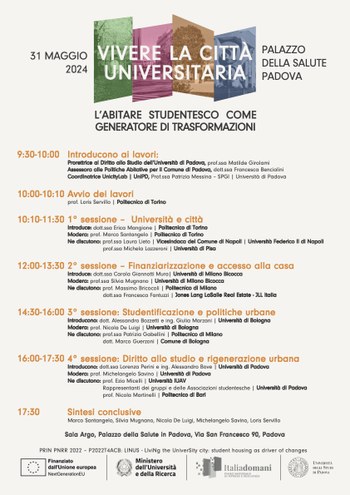News
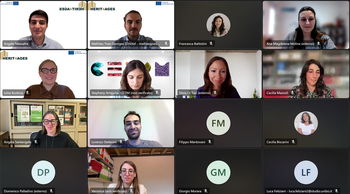
Co-Creation and Innovation in Cultural Heritage: HERIT4AGES Workshop Engages Stakeholders in Bologna
Bologna, Italy – May 22, 2025 – The University of Bologna hosted an interactive co-design workshop as part of the Horizon Europe-funded HERIT4AGES project, aiming to revolutionize energy efficiency in heritage buildings without compromising their historical integrity. Held online, the event brought together 21 researchers, stakeholders, and technical experts to share progress, gather feedback, and collaboratively refine retrofitting solutions for the Bologna pilot site.
The workshop, titled “Bologna’s Herit4ages Lab: Co-Creating Energy-Efficient Solutions”, showcased the pioneering work conducted at the historic engineering building of the University of Bologna, a listed site where conventional insulation techniques are restricted. The session opened with an overview of HERIT4AGES’ integrated tools, including digital twin technology, environmental sensors, and custom-designed clay-based insulation panels, all tailored for heritage-sensitive contexts.
Participants were introduced to the latest advancements in sensor deployment, led by Fundación Santa María la Real, which installed a comprehensive environmental monitoring system. This includes temperature, humidity, CO₂, VOC, and light sensors, as well as people counters and smart energy monitoring devices. These tools form the basis of the Monitoring Heritage System (MHS), already implemented in over 125 heritage buildings worldwide.
A core highlight of the event was the presentation of innovative clay-based interior insulation panels developed collaboratively by UNIBO and CETIM. These panels—produced from local and recycled materials like hemp hurds, reeds, and expanded clay—exhibit high thermal performance and a low environmental footprint. Through a circular approach, their life cycle was analyzed to minimize carbon emissions and optimize reuse.
The event concluded with a Slido interactive survey and open discussion, enabling participants to express preferences on materials, installation techniques, and functional features. These contributions will guide the refinement of the prototypes and the final implementation in the Bologna Living Lab.
The HERIT4AGES initiative demonstrates how heritage preservation and climate action can be mutually reinforcing. By combining technical innovation with stakeholder engagement, the project is setting a benchmark for sustainable retrofitting in historical contexts across Europe.
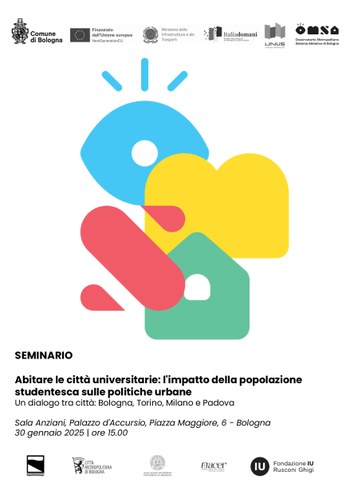
Abitare le città universitarie: l'impatto della popolazione studentesca sulle politiche urbane. Un dialogo tra città: Bologna, Torino, Milano e Padova
DATA: 30 GENNAIO 2025 dalle 15:00 alle 17:00
LUOGO DELL’EVENTO: Sala Anziani, Palazzo d'Accursio, Piazza Maggiore 6, Bologna
L’incontro si propone come occasione per approfondire e discutere le politiche abitative e urbanistiche a livello regionale e locale negli ultimi vent’anni, attraverso una prospettiva comparata tra le città di Bologna, Milano, Torino e Padova coinvolte nel progetto PRIN PNRR 2022 LINUS - Living the university city: student housing as drivers of changes. Il programma, di seguito dettagliato, prevede interventi istituzionali e accademici, insieme ad una tavola rotonda che riunirà i rappresentanti dei quattro gruppi di lavoro delle città coinvolte.
15:00 - Apertura dei Lavori
Emily Marion Clancy, Vicesindaca del Comune di Bologna
15:15 – Protagonisti e prospettive delle politiche urbane
Carlo Cellamare, Università La Sapienza di Roma
15:45 - Tavola Rotonda: le politiche abitative e studentesche nelle città di Bologna, Torino, Milano e Padova
Introduce e modera: Loris Servillo, Politecnico di Torino
Partecipano alla tavola rotonda:
Elisa Conticelli, Università di Bologna
Marco Santangelo, Politecnico di Torino
Silvia Mugnano, Università di Milano Bicocca
Michelangelo Savino, Università di Padova
16:45 - Sintesi Conclusive
Marco Guerzoni, Direttore Settore Politiche Abitative, Comune di Bologna
17:00 - Chiusura dei Lavori
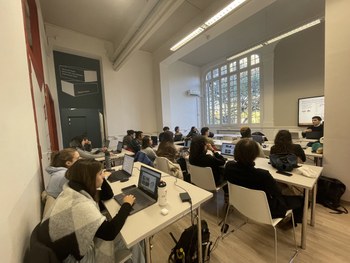
Co-Designing Sustainable Solutions for Heritage with HERIT4AGE
Bologna, Italy – November 21, 2024 – the University of Bologna hosted a co-designing workshop as part of the HERIT4AGES project, uniting 17 architecture and engineering students with project partners from UNIBO and CETIM. The workshop focused on developing innovative solutions for panels and digital twin systems tailored to enhance energy efficiency while preserving heritage integrity.
Funded under the Horizon Europe research and innovation programme, the HERIT4AGES project leverages cutting-edge technologies and participatory design to create adaptable, scalable solutions that respect the historical value of such buildings. The project seeks to enhance the energy efficiency of heritage buildings, ensuring their continued significance in a changing society and environment.
The workshop exemplified how collaborative processes can drive real-world innovation, integrating the perspectives of building occupants and future professionals. Participants engaged in interactive sessions aimed at understanding occupants’ needs, identifying technical challenges, and co-designing renovation solutions. Guided by experts, the workshop balanced technology and cultural heritage to address the unique challenges posed by the pilot site of the Historical building of the University of Bologna.
The outcomes of this workshop will be shared with local stakeholders and project partners in January 2025, guiding the development and implementation of HERIT4AGES solutions at the pilot site. This initiative represents a critical step in fostering sustainable innovation in heritage conservation and engaging the next generation of architects and engineers in meaningful change.
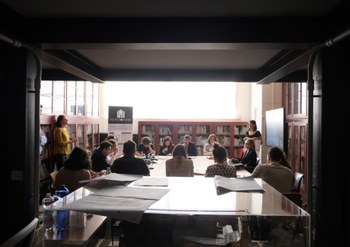
Herit4ages - Workshop on Heritage Building Energy Efficiency
Bologna, Italy – June 4, 2024 – The Department of Architecture at the University of Bologna hosted an enlightening workshop titled "Navigating Heritage Energy Efficiency: Understanding and Mapping Stakeholders". The workshop was the first opportunity to present the Herit4ages project to local stakeholders, establishing a foundation for future collaborations.
Funded under the Horizon Europe research and innovation programme, the Herit4ages project underscores the necessity of merging heritage conservation with sustainable development. The project seeks to enhance the energy efficiency of heritage buildings, ensuring their continued significance in a changing society and environment. Recognizing the diverse nature of heritage buildings across Europe and the varying levels of protection afforded by preservation laws, Herit4ages aims to develop adaptable solutions replicable in different contexts.
The historical engineering building at the University of Bologna serves as one of the 5 pilot sites of the project. As a Heritage Living Lab, the building presents unique challenges, particularly since changes to its exterior are prohibited, ruling out traditional outer thermal insulation methods. The project’s innovative solutions focus on enhancing energy efficiency within the building's constraints, particularly in its classrooms.
The workshop was designed to introduce the Herit4ages project to local stakeholders, demonstrating potential strategies for improving energy efficiency while preserving historical integrity. It emphasized the critical role of social acceptance and stakeholder engagement in implementing energy efficiency measures in heritage buildings. The workshop targeted a broad range of local stakeholders, including regulators, advisory bodies, and representatives from the Bologna pilot site. Conducted in a hybrid format, the event was accessible to all participants, featuring presentations and interactive activities.
As the Herit4ages project moves forward, the insights gained from this workshop will be instrumental in ensuring the project's success in Bologna and beyond. By fostering collaboration and understanding among local stakeholders, the University of Bologna is at the forefront of preserving our heritage while paving the way for a sustainable future.

RescueME Community Conversation No. 2
The CoP regularly gathers interantional experts from policy, research, industry, and practice on topics of resilience, climate change adaptation, disaster risk management, heritage (landscape) management, and sustainable development.
After the first Community Conversation introduced the RescueME project, how it characterizes cultural landscapes, and how it plans to measure resilience, this second Community Conversation will try to answer the following questions:
How are different cultural landscapes across Europe affected by climate change?
What are potential resilience solutions from the cultural and creative industries?
What ways to finance resilience solutions exist?
What are adaptive governance approaches for resilience?
How do the RescueME ATLAS, its meta-repository of resilience solutions, and its government typologies support answering these questions?
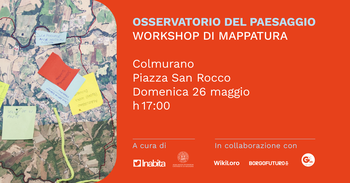
Osservatorio del Paesaggio Val di Fiastra - Workshop di Mappatura
Il workshop di mappatura dell’Osservatorio del Paesaggio sarà l'occasione per esplorare e dare forma al paesaggio culturale della Val di Fiastra, insieme alle comunità dei paesi della vallata.
Dopo una breve introduzione del progetto e dell'Osservatorio, si darà spazio alla condivisione di storie, idee e aspirazioni legate al nostro territorio.
L’obiettivo è creare una mappa percettiva del paesaggio della vallata dal punto di vista delle persone che la abitano, che potrà includere oggetti, foto, disegni, registrazioni audio di interviste o testimonianze e parole chiave raccolte tramite post-it.
Qui Val di Fiastra è un progetto di rigenerazione culturale e sociale, vincitore del Bando PNRR Borghi, coordinato da Inabita e promosso dai comuni di Ripe San Ginesio, Colmurano e Loro Piceno, che si estende nei suoi interventi anche su Urbisaglia, Sant’Angelo in Pontano e San Ginesio.
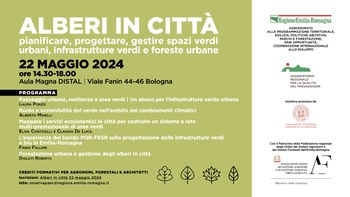
ALBERI IN CITTÀ
Pianificare, progettare, gestire spazi verdi urbani, infrastrutture verdi e foreste urbane
22 maggio 2024
ore 14:30-18:00
Aula Magna DISTAL, Viale Fanin 44-46 Bologna
L’incontro, organizzato dall’Osservatorio regionale per la qualità del paesaggio, presenta gli esiti di un accordo di collaborazione tra la Regione Emilia-Romagna (Area territorio, città, paesaggio e Settore patrimonio culturale) e i Dipartimenti di Architettura e Scienze e Tecnologie agroalimentari dell’Università di Bologna, finanziato grazie al progetto “Mettiamo radici per il futuro”.
Gli interventi mirano a indagare il ruolo cruciale che il sistema a rete di spazi verdi può giocare nella rigenerazione della città costruita. In un’ottica multiscalare e pluridisciplinare saranno presentate esperienze in atto e studi sulla relazione che intercorre tra effetti del cambiamento climatico e sostenibilità e gestione delle aree verdi urbane. Si darà inoltre conto degli esiti della ricerca svolta da UniBO e Regione su pianificazione, progettazione e gestione di infrastrutture verdi e foreste urbane.
https://ambiente.regione.emilia-romagna.it/[…]/homepage
Programma
Paesaggio urbano, resilienza e aree verdi | Un abaco per l’infrastruttura verde urbana
Laura Punzo
Ruolo e sostenibilità del verde nell’ambito dei cambiamenti climatici
Alberto Minelli
Mappare i servizi ecosistemici in città per costruire un sistema a rete multi-prestazionale di aree verdi
Elisa Conticelli e Claudia De Luca
L’esperienza del bando POR-FESR sulla progettazione delle infrastrutture verdi e blu in Emilia-Romagna
Fabio Falleni
Forestazione urbana e gestione degli alberi in città
Roberto Diolaiti
Crediti formativi per agronomi, forestali e architetti
Info: osservapaer@regione.emilia-romagna.it
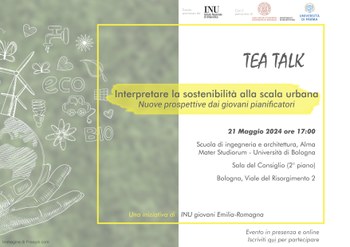
Tea Talk - Interpretare la sostenibilità alla scala urbana. Nuove prospettive dai giovani pianificatori
21 maggio 2024 ore 17:00
Scuola di ingegneria e architettura, Alma Mater Studiorum - Università di Bologna
Sala del Consiglio (2° piano)
Bologna, Viale del Risorgimento 2
INU giovani Emilia-Romagna intende promuovere attivamente la partecipazione delle generazioni di pianificatori più giovani alle attività della sezione grazie all'organizzazione della prima di una serie di Tea Talks per dare voce ai giovani pianificatori appartenenti al mondo della ricerca e della pratica urbanistica e operanti nella nostra regione. Con l'iniziativa si vuole promuovere le loro attività e il loro punto di vista, in una logica di scambio proficuo di conoscenze e in un’atmosfera informale.
Programma della Tea Talk
Modera: Prof. Stefano Stanghellini, Presidente Onorario INU
17:00 - Saluti istituzionali e introduzione alla tea talk
17:10 - La nuova prospettiva dell’economia circolare per la pianificazione di città e territori del futuro
Ing. Giulia Marzani, Dipartimento di Architettura, Università di Bologna
17:25 - Il ruolo chiave della mobilità attiva per la pianificazione di città più resilienti e inclusive
Arch. Gloria Pellicelli, Dipartimento di Ingegneria e Architettura, Università di Parma
17:40 - Dalle strategie del PUG al Masterplan: strumenti di rigenerazione per il Campus Universitario di Modena
Arch. Annalisa Lugli, ufficio Piano Urbanistico Generale del Comune di Modena
Arch. Maria Elisa Grosoli, servizio di Rigenerazione e Qualificazione della Città Pubblica e Strumenti Negoziali del Comune di Modena
17:55 Discussione e Q&A
18:25 Conclusione della talk
Evento in presenza e online
Registrati per partecipare
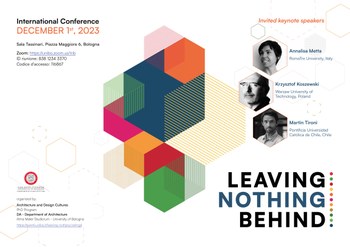
International Conference "Leaving nothing behind"
The University of Bologna's Doctoral Course in Architecture and Project Cultures students (XXXVII cycle) are pleased to invite all interested parties to the International Conference "LEAVING NOTHING BEHIND", for a conversation thinking outside the box and beyond borders to define new interactions between project cultures and other disciplines.
The Conference is divided into three tracks that will investigate and debate various problems of inclusivity, justice, and non-discrimination:
1. Leaving NO DATA behind, which refers to the long-term implementation of emerging technologies as inclusive solutions for future data access, management, and preservation;
2. Leaving NO LANDSCAPE behind, which addresses issues of spatial justice and environmental justice, as well as the protection and enhancement of cultural and natural heritage;
3. Leaving NO SPECIES behind, proposing new ways to co-design relationships between human and nonhuman worlds.
The Conference will be held on 1st December 2023.
The participation to the LBN Conference is possible both in-person, at Sala Tassinari, Piazza Maggiore 6, 40121, Bologna, IT and Online, via Zoom.
Please, express your preference about the modality of participation by filling out this form: LNB International Conference Participation Form
Due to capacity limits of the venue, the in-person attendance will be ensured only after the Organising Committee written confirmation.
For more details, please refer to the website of the conference at: https://eventi.unibo.it/leaving-nothing-behind
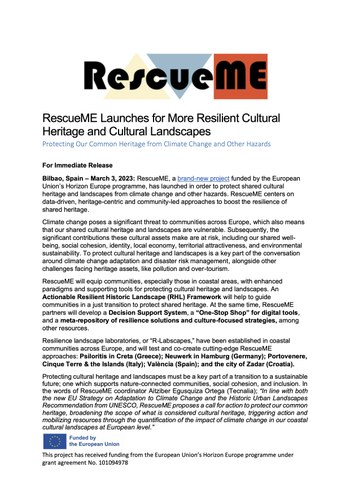
RescueME Launches for More Resilient Cultural Heritage and Cultural Landscapes
RescueME
Protecting Our Common Heritage from Climate Change and Other Hazards
RescueME, a brand-new project funded by the European Union’s Horizon Europe programme, has launched in order to protect shared cultural heritage and landscapes from climate change and other hazards. RescueME centers on data-driven, heritage-centric and community-led approaches to boost the resilience of shared heritage. RescueME mobilizes resources, engages stakeholders, facilitates decision making, and enhances the implementation of co-created and just resilience solutions to protect our common heritage.
RescueME project partners
The following partners are part of the project consortium:
1. FUNDACION TECNALIA RESEARCH & INNOVATION, Spain
2. FRAUNHOFER GESELLSCHAFT ZUR FORDERUNG DER ANGEWANDTEN
FORSCHUNG EV, Germany
3. ALMA MATER STUDIORUM - UNIVERSITA DI BOLOGNA, Italy
4. FONDAZIONE LINKS - LEADING INNOVATION & KNOWLEDGE FOR SOCIETY,
Italy
5. ICLEI EUROPEAN SECRETARIAT, Germany
6. SISTEMA, Austria
7. METEOROLOGICAL AND ENVIRONMENTAL EARTH OBSERVATION SRL, Italy
8. FUNDACION DE LA COMUNITAT VALENCIANA PARA LA PROMOCION
ESTRATEGICA EL DESARROLLO Y LA INNOVACION URBANA, Spain
9. COMUNE DI PORTO VENERE, Italy
10. DRAXIS ENVIRONMENTAL SA, Greece
11.FONDAZIONE CENTRO EUROMEDITERRANEOSUI CAMBIAMENTI CLIMATICI,
Italy
12. TECHNISCHE UNIVERSITÄT HAMBURG, Germany 13. FREIE UND HANSESTADT HAMBURG, Germany 14. DIKTYO DIMON TOU PSILORITI, Greece
15. GRAD ZADAR, Croatia
16. CONEXIONES IMPROBABLES, Spain
17. UNIVERSITE DE LIEGE, Belgium
Project Coordinator:
Aitziber Egusquiza, Tecnalia (aitziber.egusquiza@tecnalia.com)
Press Contact:
Katherine Peinhardt, ICLEI European Secretariat (Katherine.peinhardt@iclei.org)
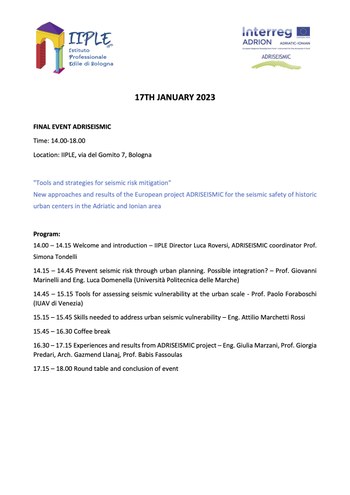
ADRISEISMIC - Final Event
"Tools and strategies for seismic risk mitigation"
New approaches and results of the European project ADRISEISMIC for the seismic safety of historic urban centers in the Adriatic and Ionian area
17TH JANUARY 2023
Time: 14.00-18.00
Location: IIPLE, via del Gomito 7, Bologna
Program:
14.00 – 14.15 Welcome and introduction – IIPLE Director Luca Roversi, ADRISEISMIC coordinator Prof. Simona Tondelli
14.15 – 14.45 Prevent seismic risk through urban planning. Possible integration? – Prof. Giovanni Marinelli and Eng. Luca Domenella (Università Politecnica delle Marche)
14.45 – 15.15 Tools for assessing seismic vulnerability at the urban scale - Prof. Paolo Foraboschi (IUAV di Venezia)
15.15 – 15.45 Skills needed to address urban seismic vulnerability – Eng. Attilio Marchetti Rossi 15.45 – 16.30 Coffee break
16.30 – 17.15 Experiences and results from ADRISEISMIC project – Eng. Giulia Marzani, Prof. Giorgia Predari, Arch. Gazmend Llanaj, Prof. Babis Fassoulas
17.15 – 18.00 Round table and conclusion of event
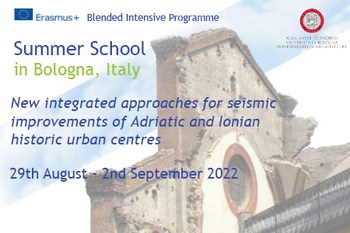
Students have been selected for the Summer School "New integrated approaches for seismic improvements of Adriatic and Ionian historic urban centres" ERASMUS+ BIP
Students have been selected for the International Summer School on "new integrated approaches for seismic improvements of Adriatic and Ionian historic urban centres" that will take place on 29 August - 02 September 2022 in Bologna.
Selected applicants are the following (in alphabetic order):
- Aurora Draghetti
- Francesco Ciavatta
- Mithali Uday Rao
- Susanna Corsini
- Sebastiano Di Mauro
We are looking forward to an interactive and intense week of learning in Bologna!
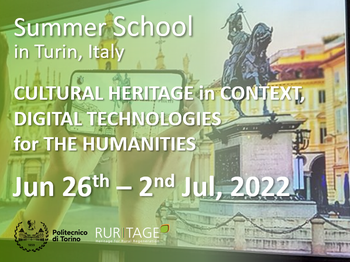
RURITAGE Summer School in Turin, Italy
The Summer School will be held at the Politecnico di Turino in cooperation with the University of California in Turin, Italy, and is arranged within H2020 funded RURITAGE project. The intensive Summer School program frames Cultural Natural Heritage (CNH)-led knowledge building and digital tools for enhancing local territories and communities. Find out more at: https://www.ruritage.eu/summer-school-2022/
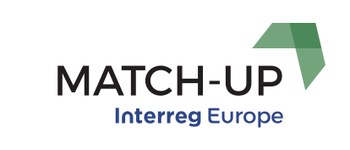
MATCH UP final conference
The MATCH UP final conference has been held online on 11th MAy 2022 with a great success, with an average of 40 attendees. It was the occasion for the partners to present all the results achieved during the last 4 years, with the aim to embed multimodal mobility strategies into policies instuments by the implementation of action plans.
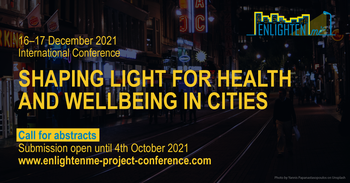
ENLIGHTENme Project Hosts International Conference “Shaping Light for Health and Wellbeing in Cities” – Call for Extended Abstracts Now Open!
From 16-17 December 2021 the recently launched EU project ENLIGHTENme will host the international conference “Shaping light for health and wellbeing in cities”. The virtual event will bring together representatives from academia, industry and local administration from across Europe for two days of exciting talks and discussions around latest findings on urban lighting in relation to citizen’s health and wellbeing. Researchers are now invited to participate in the open calls to submit extended abstract until 4 October 2021.
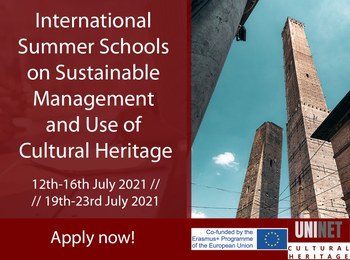
Students have been selected UNINET Summer Schools 2021!
Students have been selected for the International Summer School on Sustainable Management and Use of Cultural Heritage 19- 23 July 2021. Selected applicants are the following (in alphabetic order):
- Alberto Grassetti
- Chiara Casamassima
- Chiara Ciambellotti
- Luca Scordamaglia
- Martina Ricupero
- Valentina Suffritti
- Hend Hesham Aly Alasmar
We are looking forward to an interactive and intense week of learning in July!
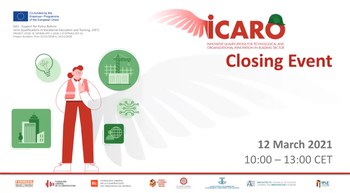
ICARO final event
In the framework of the Erasmus+ Icaro, the consortium team successfully organised the project closing event on 12 March 2021. It was attended by more than 80 participants, who had the chance to follow the online event in English as well as Italian, Lithuanian and Spanish – the official languages of the project – thanks to simultaneous translation.
You can find more about conclusions, take away messages and remarks of the event in the newsletter.
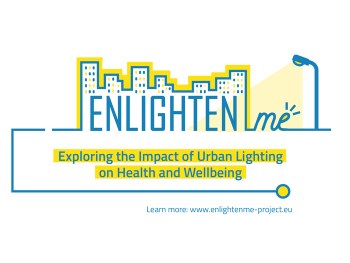
ENLIGHTENme project officially started with great resonance from the media
On 4th and 5th March 2021, the kick-off meeting of the H2020 funded project ENLIGHTENme took place in the virtual space shared between the 22 Project Beneficiaries involved. The meeting was very successful and stimulated a wide interest among press and media. More insights within the press review.
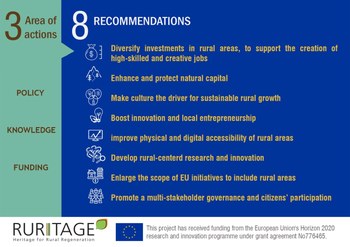
How the challenges posed by the COVID-19 pandemic can be turned into opportunities for sustainable rural growth and regeneration?
Building on the RURITAGE methodology, that identified 6 Systemic Innovation Areas and 6 Capitals as drivers for rural regeneration, in the last months RURITAGE developed a Vision Paper to support the process initiated by the European commission on long term vision for rural areas.
Read more about our recommendations to transform rural narratives towards future stimulating, attractive and inclusive rural communities!
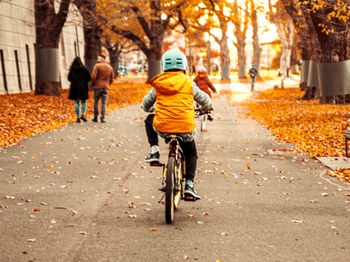
Verde e mobilità: cosa è cambiato?
Il gruppo di ricerca lavora da diverso tempo sul tema dell’importanza degli spazi verdi in città, delle loro funzioni e dei loro servizi per la salute e il benessere dei cittadini.
Per questo motivo, ci stiamo interrogando su come la chiusura dello spazio verde pubblico e la sfida di una nuova mobilità, presentatesi con forza nelle nostre città a causa della crisi sanitaria che stiamo vivendo, possano o meno aver cambiato la percezione dei cittadini riguardo il ruolo del verde in città.
Il seguente questionario è stato sviluppato all'interno di una ricerca di dottorato del Dipartimento di Architettura dell'Università di Bologna sul ruolo degli spazi verdi in città e fa seguito ad un sondaggio effettuato ad Aprile 2020 in piena fase di lockdown.
La partecipazione è assolutamente volontaria e il questionario non prenderà più di 5 minuti del vostro tempo. Ci impegneremo a pubblicare al più presto aggiornamenti su questo sito e a tenervi aggiornati sui risultati della ricerca.
Vai al questionario: https://bit.ly/2Fy4Hjm
Per qualsiasi informazione potete scrivere a planningandregeneration@unibo.it
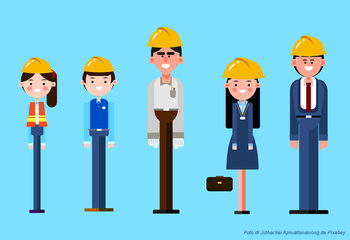
Why women and young people are under-represented in the construction industry?
'ICARO - Innovative qualifications for technological and organisational innovation in building sector' is an international project that aims at training a new generation of construction site technicians able to respond to the challenges imposed by new technologies and new regulatory framework in the building sector.
ICARO project developed a questionnaire aimed at tracking the main barriers for women and youngsters to choose a training course to become construction site technicians.
The survey takes about 5 minutes to complete and it is completely anonymous. It can be accessed from the following link: https://docs.google.com/[…]/viewform
THANK YOU so much for your time!
If you have questions, you can contact us at: planningandregeneration@unibo.it
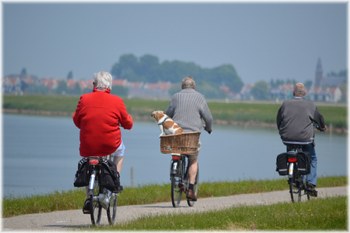
Verde e mobilità: cosa è cambiato?
Il gruppo di ricerca lavora da diverso tempo sul tema dell’importanza degli spazi verdi in città, delle loro funzioni e dei loro servizi per la salute e il benessere dei cittadini.
Per questo motivo, ci stiamo interrogando su come la chiusura dello spazio verde pubblico e la sfida di una nuova mobilità, presentatesi con forza nelle nostre città a causa della crisi sanitaria che stiamo vivendo, possano o meno aver cambiato la percezione dei cittadini riguardo il ruolo del verde in città.
La partecipazione è assolutamente volontaria e il questionario non prenderà più di 5 minuti del vostro tempo. Ci impegneremo a pubblicare al più presto aggiornamenti su questo sito e a tenervi aggiornati sui risultati della ricerca.
Vai al questionario: https://bit.ly/2Y9phO3
Per qualsiasi informazione potete scrivere a planningandregeneration@unibo.it
